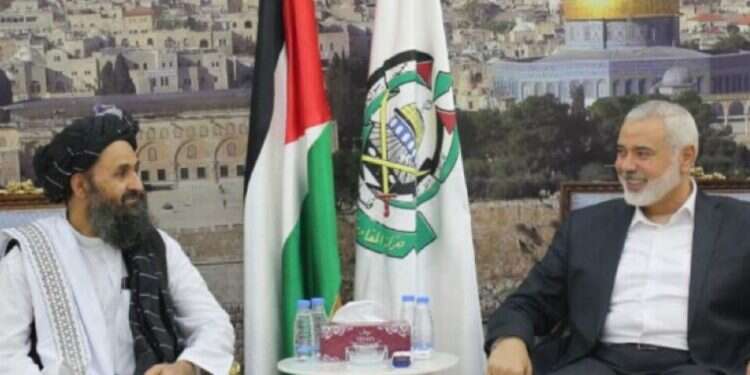Not too many years ago, the idea of a Saudi court sending dozens of Hamas members who had been operating out of the kingdom to prison would have seemed almost inconceivable. But this week, what once appeared a near-impossibility came to pass. Saudi Arabia, which used to be an economic paradise for members of al-Qaida and Hamas, sentenced 64 Hamas operatives convicted of money laundering and smuggling money to Hamas' armed wing in the Gaza Strip to prison.
Follow Israel Hayom on Facebook and Twitter
Only two decades ago, the Saudis still had strong ties to terrorism, with 60% of Hamas' budget at the start of the millennium coming from Saudi sources. Millions of shekels were handed over to families of suicide bombers as "compensation" or "stipends." In the files of the Shin Bet security agency, one can still find remarks by high-ranking Saudi officials from the time of the Second Intifada, praising the suicide bombings. Sheikh Saleh bin Abdul-Aziz, for example, Saudi Arabia's minister for Islamic affairs, who said that armed jihad by the Palestinians was permissible just before a suicide bombing in Rishon Lezion; or Saudi Ambassador to Britain Ghazi Katzive, who published a poem praising the bombers.
Even a decade ago, the Saudis were still ambivalent about terrorism. In December 2010 Wikileaks published a memo from then-US Secretary of State Hillary Clinton in which she claimed that the Saudis, a major US ally, was a key source of funding for terrorists and that terrorist groups were raising "millions of dollars a year" from Saudi sources, often during the Haj pilgrimage. Clinton noted that Saudi officials comprised the main source of funding for Sunni terrorist organizations worldwide.
That memo didn't exactly shock anyone, mostly because years earlier, US-Saudi ties had already been dogged by rumors about the Saudi links to the 9/11 attacks (which were planned by al-Qaida in Afghanistan). Fifteen of the 19 hijackers in the attacks were, as we now know, Saudi citizens.
But now, possibly because of its problematic past, and also because Iran has now become the main backer of global terrorism, the Saudis are trying to do things differently. The 64 Hamas operatives based in Saudi Arabia were sentenced to anywhere from eight months to 22 years behind bars. Their money laundering-smuggling operation made use of Turkish money changing companies. The convicted operatives include high-ranking Hamas official Dr. Mohammed Al-Khudari, 80, who headed the Hamas delegation to Saudi Arabia for 30 years and who has now been sent to prison for 15 years.
The Saudis didn't bother responding to Hamas leader Ismail Haniyeh's publicly expressed hopes for clemency. Hamas' attempts to send Mohammad Dahlan to work on the Saudis also met with a cold shoulder.
Despite the change in the Saudis' behavior when it comes to terrorism in general and Hamas in particular, their dark past continues to pursue them. The Biden administration, unlike that of former President Trump, is not eager to forgive them. Three years after the Saudis declared Hamas a terrorist organization, Biden this week threw cold water on the Saudis' open attempts to win his trust.

Biden recently announced that he "welcomed the Department of Justice's filing … which commits to conducting a fresh review of documents where the government has previously asserted privileges." The publication of the classified section is supposed to provide at least a partial answer to whether and to what degrees the Saudis were involved in the attacks. The White House took this step in response to pressure from the families of the 9/11 victims.
The Al-Thumairy riddle
Biden's announcement this week came as a shock to the Saudis, just like their conviction shocked Hamas. Formally, they have long been calling for the publication of the classified 9/11 documents, while vociferously denying any involvement in the attack on the Twin Towers, but there is no doubt that they would prefer not to open this Pandora's box.
The documents, which might soon be made available, comprise 28 pages of a secret addendum to the Congressional report of 2002. Among other things, they address the role that Fahad al-Thumairy, a functionary at the Saudi Consulate in Los Angeles and an imam at a San Diego mosque that two of the 9/11 hijackers visited, did or did not play in the attacks. Two years after the report was written, two American researchers who were members of the government committee investigating 9/11 documented a conversation between the hijackers and al-Thumairy. The latter denied any connection to the two or their friends, despite transcriptions of phone conversations that were shown to him and supposedly contradicted his answers. According to a report in the New York Times, the researchers had the impression he was lying. In 2003, al-Thumairy's US visa was cancelled, and when he tried to return to Los Angeles, he was deported to Saudi Arabia.
Until the secret documents are made public, the Saudis aren't sitting idly by. They are trying to placate the Biden administration, after the president made it clear from the start that he would not be going easy on the Saudis when it came to terrorism and human rights. One way they can do this is through Israel: Trump losing the presidency delayed or froze the process of Israel-Saudi relations being acknowledged, but Israeli and Saudi officials continue to hold meetings on a regular basis on economic and defense issues. Only recently, the Saudis ran a report in Asharq Alawsat, a newspaper owned by a member of the Saudi royal family, a notable report about Foreign Minister Yair Lapid's visit to the United Arab Emirates at the end of June that included a picture of Lapid with the Israeli flag behind him. They continue to allow Israeli flights to use Saudi airspace en route to the UAE and points east, allow Israelis and Saudis to do business, and a few weeks ago even allowed judoka Tahani al-Qahtani to compete against Israel's Raz Hershko at the Tokyo Olympics.
This week's Saudi court ruling that sent the dozens of Hamas operatives to prison was also intended as a signal to the Biden administration that although the Trump era is over, relations with Israel were something to aim for. Immediately after Biden was elected, his spokespeople stressed that the US would be happy to broker formal relations between Israel and Saudi Arabia, but that it would have to be done based on "American values." The Saudi step can be seen as taking those values into consideration.
Subscribe to Israel Hayom's daily newsletter and never miss our top stories!
Apart from that, the ruling against the Hamas operatives in Saudi Arabia was more fruit borne by the revolution that the Trump and Netanyahu policies created in the Middle East. Last week it was Lapid's visit to Morocco, and this week it was Saudi Arabia's ruling about Hamas.
Saudi is at least as worried as about Iran as Israel is, and possibly more. The attack on Saudi oil production facilities by Iran or its Houthi satellites in September 2019 made it clear to the Saudis whose side they should be on. Iran's ongoing support for the Houthis, who are fighting against Saudi Arabia in Yemen, has only bolstered this inclination.
Honored by President Raisi
Hamas, which the Saudis tossed out on its ear this week, has long since become an open ally of Iran. The organization recently forced Saudi Arabia into a corner when its representative in Yemen, Moaz Abu Shamala met with Mohammed Ali al-Houthi, a member of the Houthis' Supreme Political Council, who are allies of Iran and enemies of Saudi Arabia. Abu Shamala gave his Houthi hosts a shield of honor form Hamas in thanks for the Houthis' support for the Palestinian issue – effectively spitting in the Saudis' face.
This week, as if to complete the picture, senior Hamas official Mousa Abu Marzouk congratulated the Taliban for its victory in Afghanistan. Hamas even published picture of a meeting between its leadership and that of the Taliban that took place after Operation Guardian of the Walls in May.
From Israel's perspective, Saudi Arabia has in the past few years been moving from an enemy state and supporter of terrorism to an entity that is a loyal member of the axis against Iran and its satellites.
Recently, Saudi researcher and journalist Khaled al-Sulaiman defined the Saudis' priorities as "Liberating Palestine from Iran before liberating it from Israel." Things like these are not published without approval form the Saudi royal family, and they reflect the winds of change in Saudi Arabia.
And Iran? It has indeed taken control of Hamas. This past May, at the end of the campaign Hamas waged against Israel, Haniyeh thanked the Iranian regime for the money and weapons the latter had supplied to the Gaza Strip. Last week, he visited Tehran and declared that his organization would stand alongside Iran against any threat from Israel or America, as part of the "axis of resistance."
Haniyeh spoke just after a Hezbollah rocket attack on the Galilee and an attack on the Israeli-owned cargo ship Mercer Street off the coast of Oman. High-ranking Hamas officials have visited Iran along with senior members of the Palestinian Islamic Jihad, under Ziad al-Nahala. Haniyeh and al-Nahala took part in the swearing-in ceremony of Iranian President Ebrahim Raisi, and were honored with seats in the front row of Iran's parliament.
Hamas setting itself up as an open ally of Iran, Saudi Arabia's biggest enemy, hovers in the background of the kingdom's unprecedented ruling against its operatives. Nevertheless, the golden era of US-Saudi relations that characterized the Trump presidency is not expected to return any time soon. The Biden administration is willing to maintain the ties, but under certain restrictions, such as Saudi crown prince Mohammad bin Salman remaining a persona non grata in Washington due to his alleged involvement in the murder of Saudi journalist and dissident Jamal Khashoggi at the Saudi Embassy in Istanbul.
It also seems as if a semi-official meeting between Prime Minister Naftali Bennett and bin Salman, like one the latter held with Netanyahu, is not a practical option right now. The Palestinian issue remains the main stumbling block to official, open relations between the Israelis and the Saudis. If under Trump it might possibly have been overcome, under Biden, the US is insisting on framing the entire issue as an obstacle.




